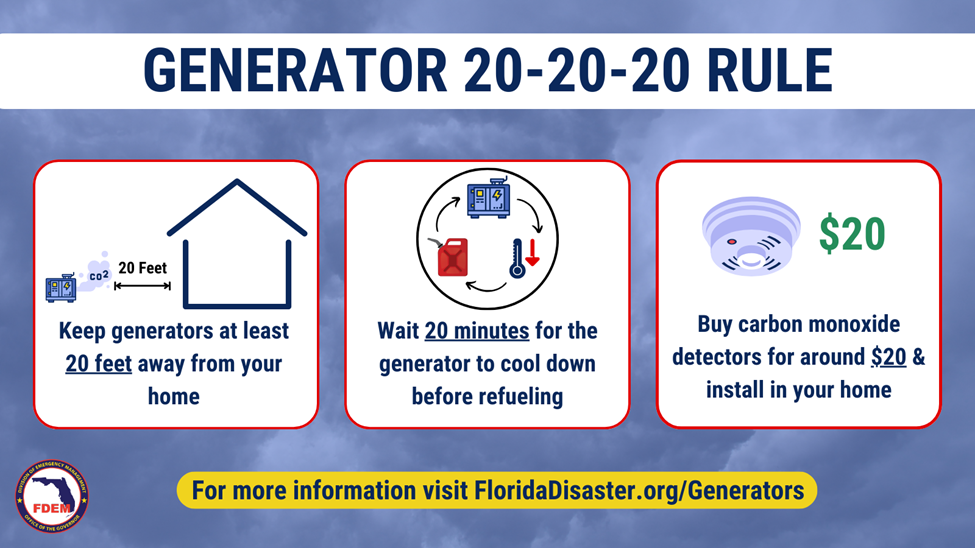Generator Safety

If you are using a generator because you have lost power, make sure you do so safely! Improperly using a generator can result in loss of life or property. Generators produce deadly and invisible carbon monoxide. You cannot smell or see carbon monoxide which is why there are recommended practices to ensure you can avoid carbon monoxide poisoning while using your generator.
Always operate your generator outdoors, far from windows, doors, and vents, as carbon monoxide can accumulate indoors if the generator is too close. Proper ventilation is key. Never run a generator in enclosed spaces like garages or basements. Additionally, ensure your generator remains dry, using a canopy or cover to protect it from rain while maintaining airflow to prevent electrical shocks.
Before refueling, turn off the generator and allow it to cool down for at least 20 minutes to prevent fire hazards from spilled gasoline igniting on hot surfaces. Use only heavy-duty, outdoor-rated extension cords in good condition, and make sure your generator is grounded to prevent electrical shocks. It’s also crucial not to overload the generator; overloading can lead to overheating or malfunction. For extra safety, install battery-operated carbon monoxide detectors in your home to alert you to any dangerous buildup of the gas. By following these guidelines, you can safely and effectively use your generator when you need it most.
Before the Storm:
- Check & Test: Ensure your generator is in good working order.
- Stock Fuel: Have enough fuel stored safely.
- Read the Manual: Familiarize yourself with operation and safety.
During the Storm:
- Operate Outdoors: Place the generator outside, away from doors and windows.
- Keep Dry: Protect from rain with a cover, ensuring ventilation.
- Avoid Overloading: Connect only essential appliances.
After the Storm:
- Inspect & Refuel Safely: Check for damage and refuel only when the generator is off and cool.
- Clean & Store: Clean the generator and store it safely.
Planning ahead can make all the difference when it comes to managing power during emergencies. Here’s what you need to know about acquiring a generator and when it’s essential:
When to Get a Generator:
- Frequent Power Outages: if you live in an area prone to frequent outages or severe weather conditions.
- Critical Needs: If you have medical equipment or other critical appliances that require continuous power.
- Upcoming Storm Season: Before Hurricane season to ensure you’re prepared in advance.
Where to Get a Generator:
- Home Improvement Stores: Major retailers like Home Depot or Lowes often have a variety of options.
- Specialty Stores: Check local stores that specialize in outdoor or emergency equipment.
- Online Retailers: Websites like Amazon offer a range of options and reviews.
Places Where Generators May Not Be Needed:
- Apartment or Condo Living
- Urban Areas with Reliable Power
- High-Rise Buildings
It is always a good idea to check with your building management or local regulations to understand what backup power solutions are already in place.

